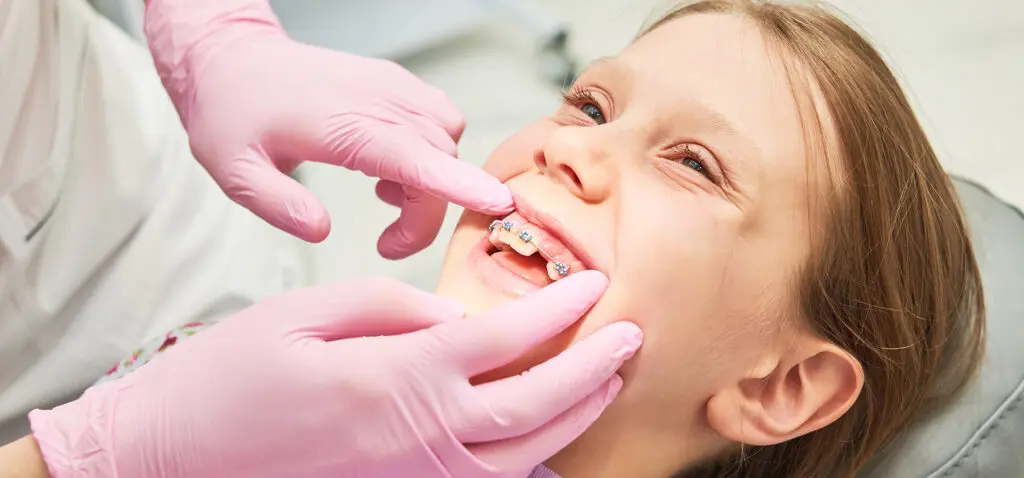Reviewed by Dr. David Sentelle, DMD, PhD, MPH
Reading time: four minutes.
An underbite is a common type of malocclusion that affects both function and appearance, but can braces correct it? The answer depends on the severity of the misalignment and the patient’s age.
In this blog, you will learn what causes an underbite, how braces can correct it, and when additional treatments may be necessary.
Table of Contents
Key Takeaway
Braces can fix mild to moderate underbites by gradually moving the teeth into proper alignment, but severe underbites may require additional treatments such as functional appliances, tooth extractions, or orthognathic surgery.
What Causes an Underbite?
An underbite occurs when the lower teeth extend beyond the upper teeth when the mouth is closed.
This misalignment, also known as class III malocclusion, can be caused by several factors:
- Genetics: If a parent or grandparent had an underbite, there is a high chance it will be passed down.
- Jaw development issues: Uneven growth of the upper and lower jaws can lead to misalignment, affecting facial structure.
- Prolonged childhood habits: Thumb sucking, excessive pacifier use, and tongue thrusting can affect jaw alignment and the proper position of the teeth.
- Trauma or injury: Severe facial injuries can disrupt normal jaw positioning, leading to bite issues and functional problems.
- Abnormal jaw growth: In some cases, an underbite happens when the lower jaw grows too much or the upper jaw doesn’t develop enough, causing a misalignment.
Can Braces Fix an Underbite?
Braces can help correct an underbite, but the results depend on the severity of the misalignment and the patient’s age.
Mild to Moderate Underbite
For patients with mild underbites or moderate underbites caused by dental misalignment (teeth positioning rather than jaw size differences), traditional braces can gradually shift the teeth into a well-aligned bite.
Braces work by:
- Moving the upper teeth forward and/or the lower teeth backward into proper alignment.
- Correcting overcrowded teeth or spacing issues that contribute to an underbite.
- Using elastic bands or additional appliances to help reposition the jaw gradually using gentle pressure.
Severe Underbites: Braces May Not Be Enough
For severe underbites (when the lower jaw is too large or the upper jaw is too small), braces alone may not fully correct the problem. Additional treatments may be necessary, such as:
- Palatal expanders (For children): A palatal expander widens the upper jaw to improve a balanced smile.
- Reverse-pull headgear (For children and teens): This orthodontic appliance helps pull the upper jaw forward while slowing lower jaw growth.
- Tooth extractions (For overcrowded cases): Removing specific teeth can create space for correction with braces.
- Orthognathic surgery (For adults with severe cases): When jaw misalignment is too significant, surgical intervention may be the only solution to reposition the jaws. Braces are still used before and after surgery to ensure a harmonious bite.
Best Age for Underbite Treatment
The ideal time to fix an underbite is during childhood or early adolescence, while the jaw is still growing.
Orthodontic treatments, such as traditional braces, are most effective at this stage because they can gently guide jaw development and correct misalignment before growth is complete.
In some cases, additional treatments like palatal expanders or orthodontic appliances may be recommended to improve results. Early intervention can prevent the need for more invasive treatments later in life.
What Happens If You Do Not Fix an Underbite?
Leaving an underbite untreated can lead to:
- Difficulty chewing and biting food properly, which can increase the risk of tooth decay.
- Speech difficulties and speech impediments due to tongue positioning affecting speech clarity.
- Jaw pain and TMJ disorders from misaligned bites leading to chronic discomfort.
- Increased wear and tear on teeth, causing excessive wear and oral health issues over time.
- Aesthetic concerns that may impact confidence, affecting a pleasing smile and self-esteem issues.
- Higher risk of gum disease and tooth decay, due to difficulty maintaining oral hygiene with misaligned teeth.
- Potential for sleep apnea and breathing difficulties, as an underbite can contribute to airway obstruction.
Are Braces the Solution for Your Child?
Braces can fix an underbite in many cases, but the effectiveness depends on the severity and the age of the patient.
Children and teenagers have the best chance of achieving a harmonious smile with braces and functional appliances. Adults with severe underbites may require braces combined with surgery for the best results.
Book a Consultation at Lonestar Kid’s Dentistry in Prosper, TX
Regular dental checkups are essential for monitoring your child’s tooth and jaw development. If an underbite is detected, our team can provide guidance and refer you to a trusted orthodontist if needed.
To book an appointment at our pediatric dental office in Prosper, TX, call (469) 228-4402 or visit us at 240 S. Preston Road, Suite 10, Prosper, TX.
📍Other locations
